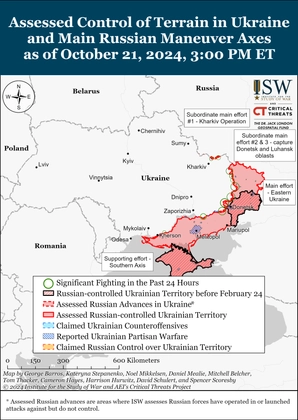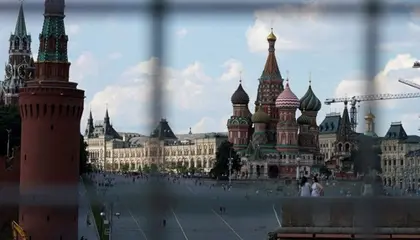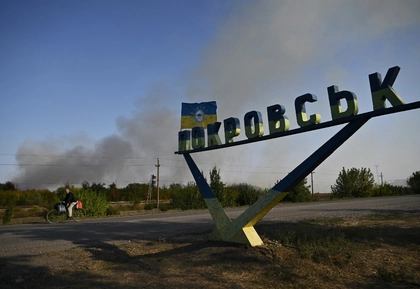In the planetary game of Risk that has been unfolding in front of our eyes for the past two years, many predictions have been made and died a death. And while on-going situations offer a plethora of possibilities in the coming days, weeks and months, there is a chance of the October Hamas attack on Israel further impeding the already lackluster US war efforts against Russia. It could also give Biden the excuse he needs to stop Ukraine’s only lifeline – that of foreign military assistance.
While Ukraine will still be receiving US assistance through the Ukraine Security Assistance Initiative, the Foreign Military Financing program and the Replenishment of US weapons stocks, the lend-lease to Ukraine ended on Oct. 3, coinciding with the end of the US fiscal year.
The lend lease program is the quickest means of getting approval to receive military aid from the US. As Ukraine is about to enter the winter months, with the need to secure the safety of the power and heating infrastructure through air defense, it also faces the added pressure of maintaining the push on the front lines. Both objectives require a steady flow of rapid decisions on new weapons systems to defend the country from Russian attacks.
And while Ukraine’s ability to receive aid through the three current programs is more beneficial on paper, not being subject to payments, the right-wing political pressure in the US to provide “value for money” in response to the war in Ukraine will dampen the speed and domestic support for US arms sent to Ukraine in the same quantities as before.

ISW Russian Offensive Campaign Assessment, October, 22, 2024
With US assistance to Ukraine set to continue in some form, a look at actors orchestrating the attack on Israel and those potentially set to be involved in any future discussions on peace in the region, may spell disaster for Ukraine.
Presently, US state officials are actively putting distance between Iran and the Hamas attack. Secretary of State Antony Blinken said: “In this specific instance, we have not yet seen evidence that Iran directed or was behind this particular attack.”
Commenting on his statement, Catherine Perez-Shakdam, a research fellow of the American Centre for Levant Studies, said: “The current US administration has been more lenient on Iran than the previous Trump government, as visible through the push to restart the Joint Comprehensive Plan of Action [JCPOA]… [This] would allow more room to maneuver for a country that is already less than two weeks away from developing nuclear weapons.” However, the moves to take pressure off Iran have also come from people more associated with the Trump camp.
Joel Rayburn, the former Trump administration’s US special Envoy for Syria, is adamant that Iranian leadership is not looking to draw the US into a Middle Eastern conflict. He wrote on X: “At no time in his 34-year rule has Ali Khamenei wanted a ‘broader conflict’ with the United States. That’s why he uses proxies. And it’s why whenever the US retaliates strongly against him, he backs off.”
On the one hand, Mr. Rayburn’s statement contradicts itself. Iran’s use of proxies that cause prolonged conflicts, does not take away, but only reinforces, the Ayatollahs’ desires to extend the network of Iranian operatives throughout the MENA region, financially and militarily pulling the US in. But it is equally plausible that another actor is behind the Hamas’ disregard for personal preservation after attacking the greatly militarily superior Israel.
Russia’s potential influence
For Russia, the attack on Israel is an opportunity. And while, presently, the topics of discussion are fixed on the US involvement in the war and ability to support Ukraine and Israel, the strategic positioning that the West has allowed Russia to enjoy for the last decade in the MENA may be the crucial deciding factor in how the US chooses to act vis-à-vis aid to Ukraine.
Russia’s presence in Syria has become considerably weaker following the death of Yevgeny Prigozhin and the visible demise of the Wagner PMC. And while Wagner’s territorial losses play into the hands of Iran, Russia still maintains some active military units in the area and continues to assist the Assad regime.
Russian involvement with Hezbollah has also remained strong during the Syrian and Ukraine wars. Russian President Vladimir Putin’s spokesperson, Dmitriy Peskov already said that “the risk of third forces becoming involved in this conflict is high,” pointing at the group’s potential involvement.
With the sway that Russia holds over a threat to Israel’s northern borders, it is not beyond the realms of possibility to see the Kremlin appear as an intermediary that would mitigate further escalation from those it sees as “third parties.”
Russia readies to position itself, saying: “It is very important to find ways as soon as possible to move towards some kind of negotiation process in order to reduce this escalation and move away from a military solution.” But one thing is certain – the Kremlin will not do so for free.
With the toll of foreign nationals dead and injured in Israel sadly rising, nations will not sit idly by without a declaration of support for Israel at the very least. And as the Ukrainian tally of foreign dead may be greater, the wounds and media coverage is no longer as fresh as those from the Hamas attack. Moreover, while the majority of those foreign nationals who died in Ukraine were members of volunteer service regiments, the victims in Israel were unsuspecting civilians.
With public displays of support for Israel the world over being overwhelming, and the desire to see justice for the Israeli losses being done, it remains to be seen how the global powers react and who will be included at the negotiation table.
The views expressed are the author’s and not necessarily of Kyiv Post.
You can also highlight the text and press Ctrl + Enter






